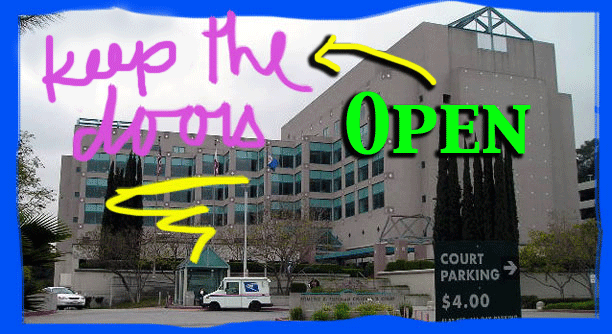There is a strong movement afoot to slam closed the door that Judge Michael Nash unlocked last week with his order to open LA’s Child Dependency Courts to the press.
Two LA Times reporters and one LA Times columnist actually observed hearings last week. (I linked to the resulting article by reporters, Garrett Therolf and John Hoeffel here and columnist Jim Newton has a wonderful essay, just published this morning.) Somehow it seems no children were hopelessly traumatized by having another stranger or two sit quietly in the room. (Life for children in the midst of dependency hearings is already, sadly, loaded with strangers.)
Yet, many believe that Nash’s order will not stand for long—not because his order was wrong, but simply because those who want to yank that door closed again may have the power to manage it.
Here’s part of what Sunday’s LA Times’ well-written editorial said about the matter, now that they’d had reporters visit.
There were furious objections to the presence of these observers, a reminder that the idea of openness is profoundly unsettling in a courthouse accustomed to doing its work in private. But privacy has bred arrogance and resistance to notions that otherwise suit society well: that the public has a right to observe its institutions at work, and that public servants should not be allowed to hide behind secrecy to disguise inefficiency, incompetence or worse.
Secrecy is absolutely the issue—and not in a good way. A child’s privacy must always be protected, but it does not take re-closing the courts to do that. What must no longer be kept secret is the process by while decisions are made for children’s lives.
Another Sunday editorial, this one by Steven Greenhut from the Franklin Center for Government and Public Integrity, writing for the North County Times, laid things out even more plainly.
Here are some clips:
….These courts and the entire children and family services systems are plagued by controversy and allegations of mismanagement and corruption. In few areas of American life do government officials have so much unchecked power, yet are allowed to operate in nearly complete secrecy. Maybe there’s a connection there.
No reforms or inquiries ever fix the situation, which is no surprise because the public doesn’t get to look at the inner workings of these agencies or delve into the details of specific cases. Los Angeles County has been a particular mess, where more than 70 children have died under the supervision of county social workers since 2008, and many of those deaths have been blamed by county leaders on mismanagement.
[SNIP]
It’s so frustrating how every serious policy issue in this state is driven by what’s best for government employees, not the public. In support of the Feuer bill [which tried to institute a pilot program to open some courts], the San Jose Mercury News opined: “Three years ago, Mercury News reporter Karen de Sá documented the troubled state of this system. Her yearlong investigation found that overwhelmed, undertrained lawyers weren’t properly representing their clients, that older children were too often excluded from proceedings affecting their lives, and that parents’ and children’s rights were routinely at risk.”
That’s exactly right. And, according to the Times report, Nash argued: “There is a lot that is not good (in the dependency courts), and that’s an understatement. Too many families do not get reunified … too many children and families languish in the system for far too long. Someone might want to know why this is the case.”
Yet Nash’s thinking is treated as something that’s almost radical. The simple and humane reform he imposed in his courtroom is being challenged in court by the same self-interested parties that have stopped reform in the Capitol. Openness is the rule in 17 states, so this isn’t some uncharted territory.
This is a very delicate matter to navigate well. And the court has to have broad discretion to protect kids. But the secrecy has to stop.
We’ll be tracking this issue closely.
NOTE: Here’s a clip from the LA Times’ Jim Newton’s column on his experience in court last week, which was published after I posted. By the way, to fend off challenges by DCFS lawyers Newton brought his own lawyer. (Smart move.)
I have been attending trials in Los Angeles for 20 years. I’ve covered torture and murder, drug smuggling and bank robberies. I covered the trial of the officers who beat Rodney G. King and the rioters who beat Reginald O. Denny. I covered the murder trial of O.J. Simpsonand the child molestation investigation of Michael Jackson. I’ve been put on the stand and been told to reveal my sources for some unflattering documents regarding Police Chief Willie L. Williams (I refused). But one type of hearing has remained presumptively off-limits.
Until last week. On Wednesday morning, I took a seat in Courtroom 415 at the Los Angeles Dependency Court, where cases are heard involving child abuse and neglect. Judge Amy Pellman brought the room to order promptly at 9 a.m. and informed anyone who didn’t know already that I was there to observe for the day. She asked whether anyone objected to my staying. Boy, did they.
For years, advocates of greater transparency in the child welfare system have argued that public and press access to dependency courts would improve the public’s sense of how that system works. But the forces in favor of secrecy were strong – a combination of well-meaning defenders of children’s privacy and unions and legal organizations who want to shield social workers, lawyers and others from public scrutiny. Those forces had prevailed until this month. But then Michael Nash, the presiding judge of Los Angeles Juvenile Court, issued an order decreeing that dependency hearings, which had been presumptively closed, were now to be presumptively open to the press. As a member of the press, I went last week to take advantage of this new right.
Read the rest here.

